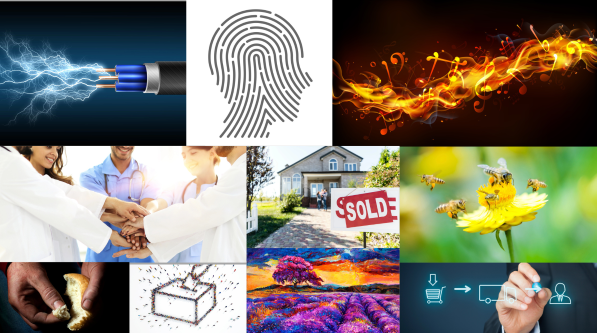In today’s rapidly evolving digital landscape, blockchain technology continuously redefines traditional paradigms, extending its reach far beyond the realms of cryptocurrency. Even though Bitcoin and Ethereum were the ones to propel blockchain into the limelight, the real power of this groundbreaking technology lies in its adaptability and broad applicability across sectors. Whether managing supply chains or revolutionizing healthcare, blockchain is ushering in a new era of innovation and disruption. It offers unconventional solutions to age-old challenges. Come along with us as we explore ten captivating uses of blockchain technology, transforming industries in ways you never thought possible.
1/ Art
Blockchain is now used by Christie’s to record information on artworks. Its Artory registry lists data on when and where a piece of art was bought, what its status is, the name of the artist, how it was made, etc. It registers everything but the owner’s true identity as many art lovers want to keep their anonymity. Christie’s recorded billions from its last auctions on it. If you wonder how it works, check it out here.
2/ Elections
The popularity of E-voting systems is on the rise globally. Although not completely adopted, many governments are contemplating switching to a digital structure. With blockchain, people can vote from anywhere and the system immediately registers and processes the vote. A few months ago, Brazil announced it was considering blockchain voting. It would be a convenient solution to apply to its vast territory: citizens cannot make their choices due to the sheer inaccessibility of polling stations. However, for the moment the project seems to be frozen. Similarly, Russia also wants to implement the blockchain. Recently, the autonomous community of Catalonia announced that e-voting would be more secure (corruption-wise) and motivating for Catalan citizens. None of these countries introduced blockchain voting, though.
3/ Electricity
That is an interesting one. South Korea announced recently it will implement the blockchain in an innovative microgrid system. Microgrids are localized sources of energy that can operate separately on their own. Presently, they are connected to the main grid controlled by a central bottleneck. The electricity company plans to substitute the central system with a decentralized one, meaning each microgrid works independently within a power ecosystem. That would remove limitations for different energy structures and would consolidate interoperations. The best of all is that it is super eco-friendly, too.
4/ Supply chains
Big chains like Walmart have started implementing blockchain technology to track its food suppliers. Recently, the Center for Disease Control and Prevention (CDC) advised the giant to carefully track its products due to E.coli outbreaks. The blockchain emerges as a highly efficient and rapid solution for such purposes. Suppliers can instantaneously upload information on food sources, transportation, and everything from the farm to the store. Other examples are Nestle and Tyson Foods. They all partner IBM on an Ethereum-based system.
5/ Healthcare
Currently, all health-related details of a patient are kept in a central system. In some countries, it is not even a digital one but still on paper documentation. Blockchain can help a lot here, literary. Making data accessible to different health services would ease the process. In today’s world, patients can travel the globe and heal in various locations. A blockchain health system would provide important information about past treatments, examinations, etc. Simultaneously, it could be updated equally from different places. This application of blockchain technology is really a crucial one.
6/ Beekeeping
A curious one. Blockchain technology can enhance hive management, supply chain transparency, and product traceability. Beekeepers who leverage blockchain can accurately record hive data, monitor environmental conditions, and track honey from hive to consumer, ensuring authenticity and quality. This innovation boosts trust and efficiency within the sector, benefiting both producers and consumers.
7/ Poverty projects
There are numerous projects already on how to use the blockchain to fight poverty. For instance, The Central Bank of China announced some time ago it will use blockchain to face the huge poverty in Tibet by upgrading its cloud services. Other examples include corruption limitations projects, ICO fundraising, cryptocurrency charity organizations, and natural disasters crowdfunds. They all stand on the principle of being part of a non-hierarchic network that triggers an alarm when there is an issue.
8/ Real estate
Blockchain would be very helpful in registering real estate. Its decentralized software can record information about land, houses, apartments, etc. And it does not end there. In fact, the accounting giant Deloitte recently released a report on prospering blockchain uses. They include faster search engines, safer real estate purchases, better leasing conditions, and cheaper commissions. That one is connected to #7. A huge part of the land in Africa is not yet registered. The blockchain would allow multiple registration processes from different places. That is another way to fight poverty.
9/ ID management
With the recent scandals of Cambridge Analytica and Facebook, the question of personal information becomes even more vital. We are all exposed to a personal attack being part of the Internet family. So, keeping our personal details secure is getting harder and extremely important. Blockchain technology could aid identity management by eliminating central data storage. If everyone could register their own information from different nodes, no one would keep our info on a server somewhere.
10/ Music
Blockchain and music make a perfect combination. Through the independence from third parties, the blockchain can improve the music-making process substantially. The decentralization can connect artists to producers, musicians, etc. Without the need for record companies, unfair contracts, and all these steps that now exist. Moreover, the blockchain can solve piracy issues, royalty management, and authorship problems. Simply put, it would let the music reach straight to the audience and both sides would benefit from it. There are many blockchain music projects already. Ujo, Viberate, Myceli, and Blokur, to name a few.
Wrapping up our exploration of these ten uses of blockchain technology, it’s clear that blockchain has a lot more to offer beyond just being used for cryptocurrencies. From improving transparency in supply chains to transforming how healthcare data is managed blockchain is bringing about changes across various industries. These creative applications demonstrate how versatile and flexible blockchain can be, providing answers to challenging issues and paving the path for a more transparent, secure, and efficient future. As blockchain continues to progress we can anticipate the emergence of more innovative applications that will solidify its position as a key technology in the digital era.
Follow our Blockchain News section for more live updates on the innovation.











[…] >>> Read more: 10 Unconventional Blockchain Uses You’d Be Surprised About […]
[…] rally has provided a favorable environment for many tokens, including HNT, to gain value. Investors increasingly seek projects with solid fundamentals and real-world applications, making Helium an attractive […]
[…] Strategic partnerships with industry leaders such as Chainlink, Optimism, and Alchemy further bolster Soneium’s development. These collaborations are designed to enhance the platform’s scalability. They will ensure it can handle the complex needs of high-volume digital transactions while maintaining user-friendliness. This focus on technical excellence is crucial for overcoming the scalability and usability challenges that have traditionally hindered blockchain adoption. […]
[…] >>> Read more: 10 Unconventional Blockchain Uses You’d Be Surprised About […]
[…] >>> Read more: 10 Unconventional Blockchain Uses You’d Be Surprised About […]